
China stock traders look for boost from Xi Jinping-led Communist Party meeting as UBS, JPMorgan pick sweet spots
- Consumers to technology sectors could get a boost from China’s new economic blueprint at plenum in Beijing this week
- Policy details could provide support local stock market, HSBC Qianhai says, where foreign inflows have topped US$100 billion since March
There is a feel-good factor about the meeting – traditionally held at Jingxi Hotel in Beijing and known as “China’s safest hotel” – because it is owned by the People’s Liberation Army.
No Chinese president has generated a bigger post-plenum impact than Xi Jinping since the Communist Party established the once-every-five-years key meeting in 1995. Stocks rose by 4.7 to 9.2 per cent a month after the plenum in 2015, compared with a range of losses and tiny gains in the preceding four gatherings since the Shanghai Stock Exchange’s inception in 1990.
“This [the five-year plan] could ease market concerns about uncertainties in relation to China’s economic development, which will give support to A-share valuations,” analysts at HSBC Qianhai Securities led by Bob Liu said in a report published earlier this month. “In particular, [it] may boost IT, high-end manufacturing, and consumer sectors more than the market expects.”
China’s stock market approaches 2018 peak on recovery tonic in abundance, stamina in doubt
It could shield traders from the US presidential election uncertainty. Despite popular belief that Democrat Joe Biden will win the race against President Donald Trump, risks abound. Fiscal stimulus is not guaranteed to pass easily before the November 3 vote, according to BCA Research.

10:08
Final US presidential debate for Trump and Biden covers Covid-19, China and ‘thug’ Kim
“The probability that the Democrats take control of the Senate is barely above 50 per cent,” it said. “If Biden takes the White House, but Republicans keep control of the Senate, much more financial market pain will be needed to prompt the implementation of any significant additional fiscal packages.”
US elections: Who is better for the stock markets of China and Hong Kong, a Democrat or Republican president?
Historically, sectors mentioned in the five-year plans have outperformed the broader market in the months following the announcement of supportive policies, according to Yang Ruomo at Dongxing Securities.
New-energy vehicle manufacturing and new material stocks, for example, advanced by 29 per cent and 34 per cent respectively in the six months after the plenum in October 2015, the analyst wrote in an October 18 report. The Shanghai Composite Index gained just 6 per cent in the same period.

05:59
Coronavirus: What’s going to happen to China’s economy?
To foster domestic demand, policymakers are likely to speed up efforts to develop city clusters and metropolitan areas, ease restrictions in the hukou system that hinders population mobility, reduce corporate taxes and raise public health care and social services spending, according to Wang Tao, head of Asia economics at UBS Group.
Within the consumer sector, HSBC Qianhai Securities recommends New Hope Liuhe and Wens Foodstuffs, as the pork producers stand to benefit from higher margins and market share in the coming year.
The brokerage also mentioned C&S Paper, one of China’s largest toilet paper manufacturers, as a promising buy opportunity because of its potential in the high-end market segment.
SCMP’s China internet Report 2020 finds that Covid-19 has accelerated digitisation of economy
Another likely focus of the blueprint is digitising the economy with the development of e-commerce, big data, artificial intelligence and the fifth-generation mobile networks, which has already been accelerated by the Covid-19 pandemic, according to Zhu Haibin, chief China economist at JPMorgan Chase.
At the plenum, new policy details are likely to be announced, detailing the so-called “dual circulation” strategy, a term coined and promoted by top officials including President Xi over the past few months.
It stresses the need to boost domestic consumption, urbanisation and technology development, or the “inner circulation.” The “outer circulation,” meanwhile, refers to the need to stay integrated with the world.
Ant’s army of advisers on the march to sell the world’s biggest IPO, with some playing a much larger role than others
The plenum this year carries even bigger significance than in the past. China is the only major global economy to rebound from the slump induced by the coronavirus pandemic and its faster recovery will be a lifeline for the economies of its big and small trading partners.
For foreign fund managers, the optimism around this week’s gathering is abundant. They have poured 90 billion yuan (US$13 billion) worth of money into China’s A-share market since the end of September, according to data from East Money Information.
Shareholding of northbound investors who trade A shares through Hong Kong’s Stock Connect programme also climbed to 3.1 per cent of the overall Chinese onshore market from 2.6 per cent in March, a result of 680 billion yuan worth of inflows between the six months, the data shows.
“Based on past experience, the market will probably rally after the announcement of the five-year plan, and sectors that receive high expectations will continue to outperform,” said Wanlian Securities analyst Xu Fei in an October 18 report.

